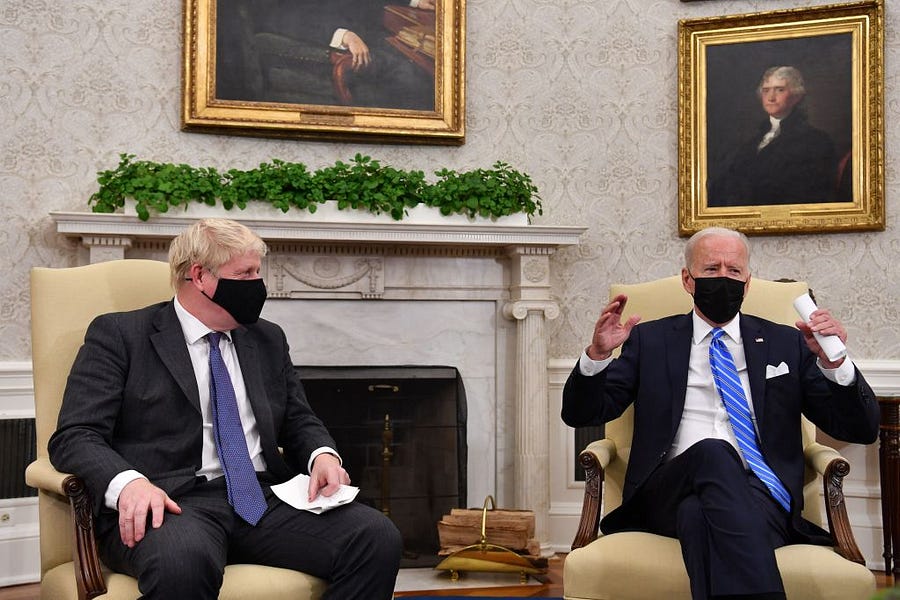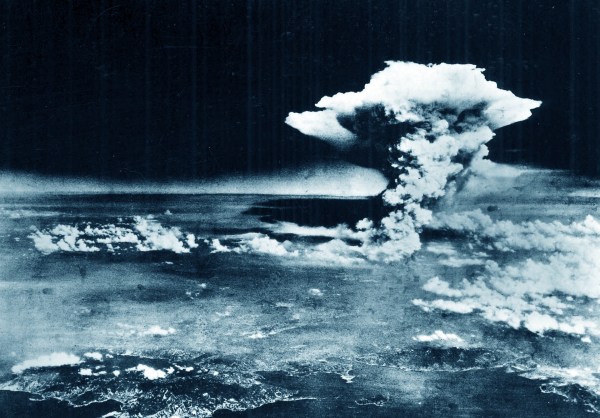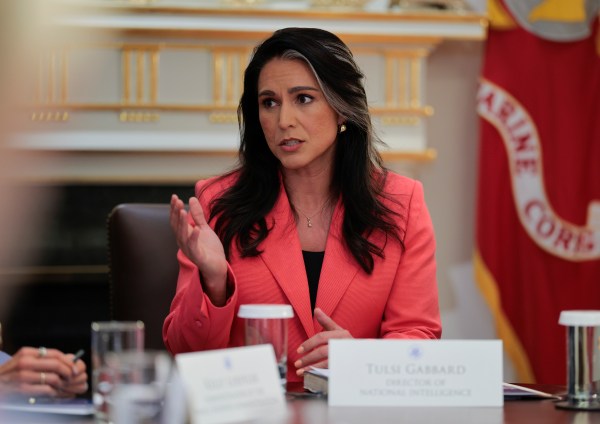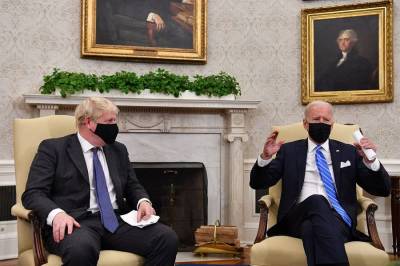U.K.-U.S. relations were hardly in great health before the calamitous allied retreat from Kabul. The British were worried that Boris Johnson’s reputation in Joe Biden’s White House had been irreversibly tarred by Brexit. Biden had reportedly described Johnson as the “physical and emotional clone” of Donald Trump in 2019. A proud Irish-American almost incapable of giving a speech without quoting Seamus Heaney was taking an unswervingly pro-EU line in the bitter row over the border between the U.K. and the Republic of Ireland. The prospects of a U.K.-U.S. trade deal, long touted as a major Brexit prize, seemed dim. And all of this after a Trump presidency that had badly strained transatlantic relations.
In other words, things weren’t great. Then Afghanistan made them worse. For all the damage the ugly scenes at Kabul airport did to Biden’s reputation at home, they arguably did more damage to his standing overseas, not least in the country that sacrificed more in Afghanistan than any foreign power other than the U.S.
No one expressed the prevailing mood in London more effectively than Tom Tugendhat, an Afghanistan veteran, Conservative member of Parliament, and chair of the powerful Foreign Affairs Select Committee. In an emergency session in the House of Commons, Tugendhat spoke of his “anger, grief and rage” at the Taliban’s rapid takeover of Afghanistan and delivered an unsparing critique of Biden’s decision to withdraw.
Other MPs described Biden’s handling of the withdrawal as “shameful” and “catastrophic.” One former minister described the president’s defense of his Afghanistan policy as “an utter repudiation of the America so many of us have admired so deeply all our lives—the champion of liberty and democracy and the guardian of what’s right in the world.”
Compounding all this anger was the unavoidable fact of Britain’s limited power to either influence U.S. decision-making or act alone. Days passed before Biden and Johnson spoke. British requests to extend the withdrawal deadline were ignored by the White House. On the ground, it was obvious that Britain and other NATO allies could not stay longer without American support. The frustrated U.K. defense secretary choked up live on television. The House of Commons issued little more than a gesture—albeit an emphatic one—by voting to hold Biden in contempt.
With the U.K. and the U.S. so obviously and publicly at odds with one another in the middle of such a major crisis, the Afghanistan withdrawal marked a low moment in the history of the special relationship, a term first used by Winston Churchill to describe the important and longstanding ties between the two countries.
Fast forward just a few weeks and the mood could hardly be more different. Those dark days in August seem a distant memory. A Tiggerish Boris Johnson is in America (where he was born) to push his climate change agenda and Global Britain brand at the U.N. and in Washington. Stretching credulity, he described the Kabul evacuation as a “massive logistical success” in an interview with the Today Show’s Savannah Guthrie in New York on Tuesday.
That, of course, is the nature of diplomacy. But even some of Biden’s most vociferous critics in London have changed their tune. In an interview with The Dispatch, Tugendhat was keen to emphasize the “extraordinarily deep” alliance between the U.K. and the U.S.
The special relationship, he told me, “is not based on governments, it’s based on people. It’s based on the fact that we share a view on how the world should work and how to cooperate to achieve the interests of both our people. It’s not always easy, but it’s a very logical relationship.”
What changed? The shortest answer to that question is one inelegant acronym: AUKUS. This partnership, announced last week in a joint virtual press conference by Biden, Johnson, and Australian Prime Minister Scott Morrison (or “that fella down under,” as Biden referred to him), has caused an almighty row, with France furious at Australia’s decision to renege on its lucrative submarine deal in favor of developing nuclear-powered alternatives with British and American help.
But the Gallic tantrum, complete with canceled parties and recalled ambassadors, masks the significance of the pact. First, the deal reveals a level of trust between the U.S. and the U.K., and now Australia, that is hard to find in any other U.S. alliances. The three countries, who already share intelligence as part of the crucial Five Eyes grouping with Canada and New Zealand (France is not a member), will now be sharing technology on crucial nuclear propulsion technology as well. And the alliance goes even further, with cooperation on strategic technologies such as artificial intelligence, quantum computing, and cybersecurity.
No wonder British National Security Adviser Stephen Lovegrove has called the pact “perhaps the most significant capability collaboration in the world anywhere in the past six decades.” It amounts to the most concrete sign yet that the Biden administration means what it says when it comes to taking the China threat seriously. (Any doubters need only look at the vitriolic Chinese reaction.)
AUKUS also reveals how little lasting damage the Afghanistan debacle did to U.K.-U.S. relations. As Sir Malcolm Rifkind, who served as foreign secretary and in various other cabinet positions under Margaret Thatcher and John Major, points out, “There’s hardly a single prime minister and president since 1945 who have not fallen out on a major issue without that having any serious consequences for the overall relationship between the two countries.”
Even leaders famous for their close relationship have had their difficult moments. Thatcher and Ronald Reagan—perhaps the closest transatlantic couple in living memory—had bad disagreements over Grenada and the Falklands. “It’s not surprising that the relationship got back to its normal strength” after Afghanistan, says Rifkind. Thanks to AUKUS, however, “it happened infinitely more quickly than anyone expected.”
Taken together, Afghanistan and AUKUS demonstrate what the special relationship is —and what it isn’t. The prime minister cannot stop America from doing things Britain doesn’t like. Nor can the British expect much special economic treatment, excessive levels of diplomatic flattery, or too many public displays of affection. Instead, the special relationship is something more quotidian. Its strength lies in very close daily cooperation on the most important and sensitive areas of security and defense. It is unglamorous and unshowy but institutionally intertwined in a way that means it doesn’t merely depend on good relations between a given prime minister and president.
As Ben Judah, a non-resident fellow at the Atlantic Council, explains: “What makes the special relationship so isn’t that Britain receives special goodies or favors from the United States, because of American love, faith or fascination, like Israel. It’s special because both countries continue to fundamentally see the threats they have in the world in the same way, and that leads them to be able to partner deeper on security, spying, nuclear and tech issues than others. It was true in the Cold War and it is proving true in the China shift.”
In many ways, the remarkable thing about U.K.-U.S. relations is how little has changed. Churchill coined the phrase “special relationship” in 1946 in Fulton, Missouri. In what soon became known as the Iron Curtain speech, he talked of the “fraternal association of the English-speaking peoples” and explicitly cited cooperation against Nazism in his call for his cooperation against communism. Just as the U.K. and the U.S. were in geopolitical lockstep for the Cold War, Tony Blair would pledge solidarity and support at the dawn of the War on Terror. For better or for worse, Biden and Johnson find themselves in the same position: at the start of a new geopolitical era and on exactly the same page. The continuity is striking. And the neatness with which the Afghanistan withdrawal was followed by the AUKUS announcement is uncanny.
Of course, none of this is a coincidence. Events have once again made the case for the unfashionable but very Churchillian idea that the close ties and common culture of Anglosphere countries counts for something. In 1898, an elderly Otto von Bismarck was asked by a journalist what he thought the decisive factor in modern history was. He replied: “The fact that the North Americans all speak English.” The 20th century would bear that out. Might the 21st century do the same?






Please note that we at The Dispatch hold ourselves, our work, and our commenters to a higher standard than other places on the internet. We welcome comments that foster genuine debate or discussion—including comments critical of us or our work—but responses that include ad hominem attacks on fellow Dispatch members or are intended to stoke fear and anger may be moderated.
With your membership, you only have the ability to comment on The Morning Dispatch articles. Consider upgrading to join the conversation everywhere.